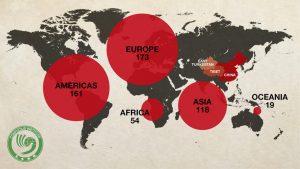Merrick Garland, President Joe Biden's nominee for U.S. Attorney General, spent two days this week answering, and sometimes evading, questions asked of him during the Senate confirmation hearings. Despite leaving unanswered questions relevant to conservative issues, Garland, the former chief judge on the D.C. Circuit Court of Appeals, appears to have essential support from Republicans and will likely be confirmed when the committee votes on Mar. 1 even without clarification of his views on many significant issues, including illegal immigration, China, the Durham probe, and domestic terrorism.
Durham Investigation
Garland committed to saying he sees "no reason" why special counsel John Durham shouldn't be left in place to continue his investigation into the origins of the Trump-Russia probe and the business dealings of Hunter Biden. When asked by ranking member Sen. Chuck Grassley (R-IA) about what he would do with Durham's investigation, Garland responded, "I understand that he has been permitted to remain in this position, and sitting here today, I have no reason to think that was not the correct decision. I don't have any reason, from what I know now, which is really very little, to make any determination on that ground. But I have no reason to think he should not remain in place."
 Speaking of the ongoing federal investigation into the Hunter Biden's tax affairs, Garland indicated that he has not spoken with the President about it. He emphasized that any Justice Department inquiries will be free of political interference. When asked by Sen. Grassley if he’s talked to the President about any Hunter Biden investigations, he replied, “I have not,” adding that, “the President made abundantly clear in every public statement before and after my nomination that the decisions about investigations and prosecutions will be left to the Justice Department. That was the reason that I was willing to take on this job. So the answer to your question is no.”
Speaking of the ongoing federal investigation into the Hunter Biden's tax affairs, Garland indicated that he has not spoken with the President about it. He emphasized that any Justice Department inquiries will be free of political interference. When asked by Sen. Grassley if he’s talked to the President about any Hunter Biden investigations, he replied, “I have not,” adding that, “the President made abundantly clear in every public statement before and after my nomination that the decisions about investigations and prosecutions will be left to the Justice Department. That was the reason that I was willing to take on this job. So the answer to your question is no.”
Gun Control
On the topic of gun control, Garland reinforced his very liberal view of gun rights, stating that he would ensure the Department of Justice (DOJ) supported Biden's drive to regulate gun ownership. When asked about the subject by Sen. Mike Lee (R-UT), Garland stated, "The President is a strong supporter of gun control and has been an advocate all his professional life on this question. The role of the Justice Department is to advance the policy program of the administration as long as it is consistent with the law," Garland continued, "Where there is room under the law for the President's policies to be pursued, I think the President is entitled to pursue them."
Illegal Immigration
When asked by Sen. Josh Hawley (R-MO) whether unlawful border crossings into the United States "should remain a crime," Garland responded by declaring, "I just don't know the answer to that question, I haven't thought about it." Hawley then asked whether Garland, if confirmed, would continue to prosecute illegal border crossings. Garland answered, "I think the President has made clear that we are a country with borders and with a concern about national security," Garland added that he is not aware of any proposal "to decriminalize but still make it unlawful to enter."
Sen. Lindsey Graham (R-SC) addressed the issue of border security, asking Garland if he would "look into that practice of using asylum claims by drug cartels to weaken border security." Garland acknowledged there is a problem and vowed to look into it, adding, "I think the drug cartels are a major menace to our society. The poison that they put into our streets is damaging communities of every kind."
Domestic Terrorism
When speaking about the U.S. Courthouse in Portland being repeatedly attacked by rioters last year (with some rioters affiliated with the Antifa network and Black Lives Matter), prompting the federal government to send officers to defend it, Garland stated at the Senate confirmation hearing that the violence may not have qualified as domestic terrorism. Garland said:
"My own definition, which is about the same as the statutory definition, is the use of violence or threats of violence in an attempt to disrupt democratic processes. So an attack on a courthouse, while in operation, trying to prevent judges from actually deciding cases, that plainly is domestic extremism, domestic terrorism. An attack simply on a government property at night, or any other kind of circumstances, is a clear crime and a serious one, and should be punished. I don't know enough about the facts of the example you're talking about. But that's where I draw the line. One is—both are criminal, but one is a core attack on our democratic institutions."
The Threat From China
Garland, when asked by Senator Marsha Blackburn (R-TN) whether the Chinese Communist Party is an enemy of the United States, replied, "Well, I don't have the same familiarity with the intelligence information that the director of national intelligence has, so in terms of comparing, say, the threat from China and the threat from Russia, I'm just not competent to make that comparison. I have learned in my professional career not to make judgments on which I am not competent."
Blackburn mentioned the "Confucius Institutes" at universities across the country, along with the belief the program is an implicit effort to spread Chinese government propaganda and gain access to research facilities. Blackburn gave an example, saying:
"For instance, recently there was a situation at Harvard with a cancer researcher and he was caught trying to smuggle 21 vials of biological material out of the U.S. and get it to China. I would hope that you agree that this threat puts American intellectual property and technology at risk and I would hope that you would assure the American people that you’re going to put the full force of the Department of Justice forward to investigate and prosecute every one of these spies that are working on U.S. soil."

Although admitting he was not familiar with the case, Garland pledged that the DOJ would take all necessary steps to combat espionage if he is confirmed as attorney general, stating, "I can assure you that the Justice Department’s national security division was created in part for the purpose of ferreting out espionage by foreign agents and that that is also the role of the FBI and the two working together. If foreign agents are caught stealing American intellectual property, American trade secrets, American materials, that they will be prosecuted."
Confirmation Likely
With the support of multiple Republicans, Garland's confirmation is expected on Monday. GOP member Sen. John Cornyn (R-TX), who serves on the panel, has backed Garland since Biden nominated him for the position. Also on the panel, Sen. Thom Tillis (R-NC) said in a statement Tuesday that he would join his fellow GOP committee members in backing Garland.
Garland also has the backing of Senate Minority Leader Mitch McConnell (R-KY) and the No. 2 Republican on the committee Lindsay Graham (R-SC), who said he was "very inclined" to back Garland's confirmation given his "very deep understanding of the threats America faces."
Sen. Ted Cruz (R-TX), who does not seem likely to confirm Garland's nomination, appeared to acknowledge his upcoming confirmation, telling reporters on Tuesday, "[His confirmation] certainly seems likely. I thought he did fine. It was frustrating in that he answered very few questions. He approached it more like a judicial nominee dodging every question."


